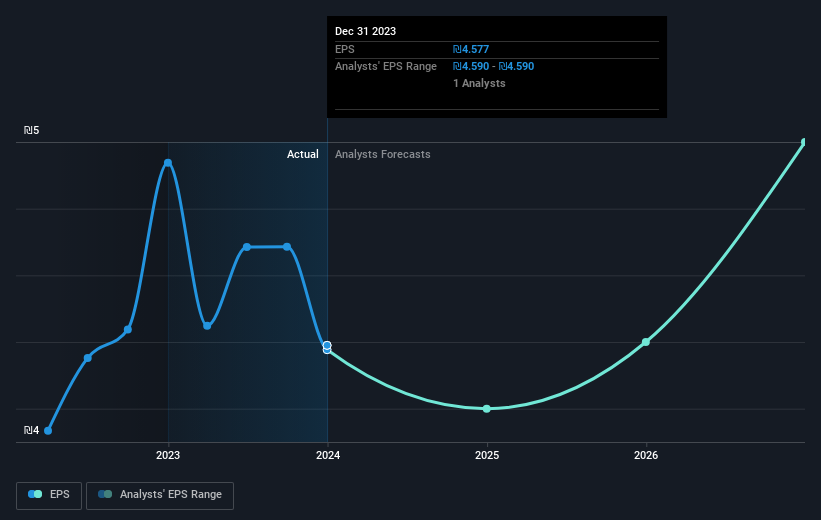Stock Analysis
Investing in Bank Leumi le-Israel B.M (TLV:LUMI) three years ago would have delivered you a 34% gain

By buying an index fund, investors can approximate the average market return. But if you choose individual stocks with prowess, you can make superior returns. Just take a look at Bank Leumi le-Israel B.M. (TLV:LUMI), which is up 17%, over three years, soundly beating the market decline of 4.4% (not including dividends). However, more recent returns haven't been as impressive as that, with the stock returning just 8.4% in the last year, including dividends.
So let's assess the underlying fundamentals over the last 3 years and see if they've moved in lock-step with shareholder returns.
Check out our latest analysis for Bank Leumi le-Israel B.M
While the efficient markets hypothesis continues to be taught by some, it has been proven that markets are over-reactive dynamic systems, and investors are not always rational. By comparing earnings per share (EPS) and share price changes over time, we can get a feel for how investor attitudes to a company have morphed over time.
During three years of share price growth, Bank Leumi le-Israel B.M achieved compound earnings per share growth of 50% per year. This EPS growth is higher than the 5% average annual increase in the share price. So one could reasonably conclude that the market has cooled on the stock. This cautious sentiment is reflected in its (fairly low) P/E ratio of 5.93.
The image below shows how EPS has tracked over time (if you click on the image you can see greater detail).

We know that Bank Leumi le-Israel B.M has improved its bottom line over the last three years, but what does the future have in store? If you are thinking of buying or selling Bank Leumi le-Israel B.M stock, you should check out this FREE detailed report on its balance sheet.
What About Dividends?
As well as measuring the share price return, investors should also consider the total shareholder return (TSR). The TSR incorporates the value of any spin-offs or discounted capital raisings, along with any dividends, based on the assumption that the dividends are reinvested. It's fair to say that the TSR gives a more complete picture for stocks that pay a dividend. As it happens, Bank Leumi le-Israel B.M's TSR for the last 3 years was 34%, which exceeds the share price return mentioned earlier. This is largely a result of its dividend payments!
A Different Perspective
It's good to see that Bank Leumi le-Israel B.M has rewarded shareholders with a total shareholder return of 8.4% in the last twelve months. And that does include the dividend. That's better than the annualised return of 7% over half a decade, implying that the company is doing better recently. Someone with an optimistic perspective could view the recent improvement in TSR as indicating that the business itself is getting better with time. While it is well worth considering the different impacts that market conditions can have on the share price, there are other factors that are even more important. For instance, we've identified 1 warning sign for Bank Leumi le-Israel B.M that you should be aware of.
But note: Bank Leumi le-Israel B.M may not be the best stock to buy. So take a peek at this free list of interesting companies with past earnings growth (and further growth forecast).
Please note, the market returns quoted in this article reflect the market weighted average returns of stocks that currently trade on Israeli exchanges.
Valuation is complex, but we're here to simplify it.
Discover if Bank Leumi le-Israel B.M might be undervalued or overvalued with our detailed analysis, featuring fair value estimates, potential risks, dividends, insider trades, and its financial condition.
Access Free AnalysisHave feedback on this article? Concerned about the content? Get in touch with us directly. Alternatively, email editorial-team (at) simplywallst.com.
This article by Simply Wall St is general in nature. We provide commentary based on historical data and analyst forecasts only using an unbiased methodology and our articles are not intended to be financial advice. It does not constitute a recommendation to buy or sell any stock, and does not take account of your objectives, or your financial situation. We aim to bring you long-term focused analysis driven by fundamental data. Note that our analysis may not factor in the latest price-sensitive company announcements or qualitative material. Simply Wall St has no position in any stocks mentioned.
About TASE:LUMI
Bank Leumi le-Israel B.M
Provides banking and financial services for households, small and medium enterprises, and corporations in Israel, the United Kingdom, and internationally.
Flawless balance sheet and undervalued.

